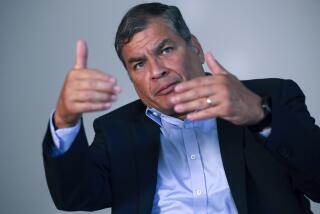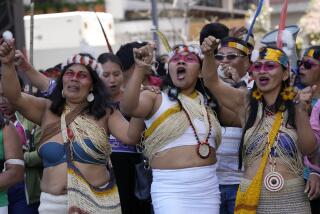Skipping Debt Payments Follows President’s Kidnapping : Ecuador Reels From Double Blows
- Share via
QUITO, Ecuador — Just as this normally low-key South American capital was recovering its balance after January’s air base kidnaping of its president, the news broke last week that Ecuador had skipped the latest interest payments owed foreign banks.
The disclosure added embarrassment on top of shock for a government that in its early months had not been accustomed to either. Once the proud example of a high-spirited Latin American leader molding his Andean nation to a conservative cast, President Leon Febres Cordero now presides over an increasingly beleaguered administration, its foreign and domestic standing eroded from a series of blows in the past year.
In retrospect, the high point of Febres Cordero’s term was marked by the burly former businessman’s visit to Washington in January of 1986. Coming on the heels of a major debt rescheduling, the trip gave senior Reagan Administration officials an opportunity to embrace the Ecuadorean chief as a like-minded ally whose free-market-oriented economic programs and support for Washington’s Nicaragua policy have been exceptions in the region.
Diminished Confidence
Six months later, with the economy in a slump and domestic politics polarized, the government received a vote of diminished public confidence. Midterm elections here surrendered the legislature to leftist and left-of-center opposition parties. Last month, Febres Cordero himself quickly surrendered at the hands of dissident air force commandos who had taken the Ecuadoran leader hostage to win release from jail of Gen. Frank Vargas Pazzos, the president’s nemesis.
“A political leader’s popularity always tends to decline a bit in office,” said presidential aide Patricio Quevedo. He blamed Febres Cordero’s slide, which he said has not been that large, in part on the bad luck of last year’s oil price slump that crimped growth here. He said the other part of the problem was “certain violently sectarian” opposition groups that have sought to provoke the president.
But increasingly, public opinion has come to accept opposition charges that Febres Cordero is himself at fault. His disregard for the legislature, abusive language and tendency to interpret the constitution and manipulate power to suit his own interests have been his own undoing, critics charge.
Ecuador’s recent troubles have also highlighted some of the institutional weaknesses in this 8-year-old democracy. The 1979 constitution fails, among other things, to give the constitutional court sufficient authority to referee conflict between the president and an opposition Congress. Court justices are appointed by the Congress for just two years.
Consequently, the armed forces have on important occasions stepped in to reinforce the president’s wishes against those of the Congress. This has thrust the military into the uncomfortable position of playing a political role and has caused splits between commanders and troops, according to several local politicians and journalists.
Rebel’s Popularity
Some political leaders see the current popularity of rebel general Vargas Pazzos, who remains in hiding, as a sign of public frustration with the inability of democratic mechanisms to bring political consensus.
“People have arrived at the conclusion that all the democratic means to confront Febres Cordero have failed,” said Osvaldo Hurtado, the scholarly Christian Democratic party leader whom Febres Cordero replaced in the presidency in August of 1984. “For this reason, they have turned toward Vargas Pazzos, who offers not a legal but an effective alternative.”
Yet the fact that Ecuador has not collapsed under all the political feuding and civilian-military tensions is taken by others as an indication of the system’s inherent strength.
“The conflict has shown that democracy is strong, that it can surmount these problems,” said Rodrigo Borja, leader of the opposition Democratic Left party and a front runner in presidential elections in January. “The country has stayed calm, showing that democracy here already has its defenses.”
Indeed, while pushing the limits of civic behavior to almost circus dimensions at times, Ecuador’s principal players have so far avoided going over the edge into a return to military rule. Pulling back from last month’s brink, the government and the opposition are now making a concerted effort to reestablish some semblance of political tranquility.
Last week, for instance, the government ducked a confrontation with Ecuador’s Congress by authorizing the resignation of members of an electoral tribunal, just as the opposition moved to impeach them. The president himself has of late been tossing out fewer insults at opponents in public.
“Things will heat up to the point of getting out of hand, then everyone will step back for awhile, not by formal agreement but in a general recognition that this is necessary to preserve the system,” one foreign resident said.
An informed foreign economic analyst here expects Ecuador to be able to meet its foreign debt by April. Unlike neighboring Peru, which has made non-payment a political and moral issue, Ecuador’s lapse appears motivated purely by a cash flow squeeze that left the government little choice.
‘Bottom of the Barrel’
“They are down to the bottom of the barrel in foreign reserves,” said the analyst. “They have been pursuing a debt rescheduling since November, but finally reached a reserve level they could not risk going below.”
Reserves are down to about $140 million, due largely to last year’s depressed price of oil. Exports of oil once accounted for about two-thirds of Ecuador’s foreign exchange earnings. Oil prices have doubled from their low point of last July, but payments are lagging.
But apart from the cash squeeze, Ecuador’s indicators are generally encouraging. The economy grew at about 2% last year despite the oil slump, and oil companies are exploring new concessions.
More to Read
Sign up for Essential California
The most important California stories and recommendations in your inbox every morning.
You may occasionally receive promotional content from the Los Angeles Times.










